We hooked up with Alec Empire not too long after Election Day. The mastermind behind Atari Teenage Riot and now his new project, The Hellish Vortex redbulled into a chilly evening and talked about his apparent optimism into 2009, his movie projects, how MySpace fame can turn into a worst nightmare and also, what you need to tweak to acquire the urban stage legend we call “riot frequency”. All this in the bowels of a Ukrainian stone-carrier ship turned into a venue on the Danube.
(Photos by Akos Stiller.)
Alec, what’s in store for you in 2009?
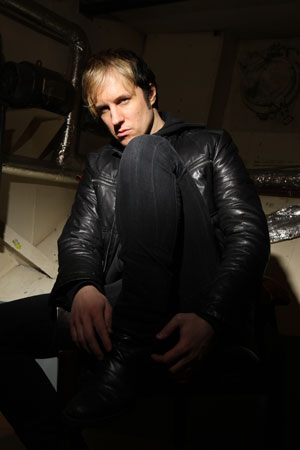 ALEC: To me, 2009 is really exciting. It may sound strange and everyone I talk to thinks I’m optimistic. I liked how the American election turned out. Of course I wouldn’t say Obama is the solution for every problem, some people play it like this. But thank God there’s at least this change, I think it has an effect on othe countries, especially his motivation to regulate parts of the financial world. I think it’s going to be a little bit more fair.
ALEC: To me, 2009 is really exciting. It may sound strange and everyone I talk to thinks I’m optimistic. I liked how the American election turned out. Of course I wouldn’t say Obama is the solution for every problem, some people play it like this. But thank God there’s at least this change, I think it has an effect on othe countries, especially his motivation to regulate parts of the financial world. I think it’s going to be a little bit more fair.
How much did you follow up on the Obama election?
ALEC: At that time I did the sound for Phantomania and we were basically on the internet all the time, every time we waited for a scene to come. I got every piece of news that came in. It was way more interesting than the previous election, the Internet gave all these different sources and I really wanted to see how the media is going to play it, like the racial issue side of this whole election. This was all new for me.
Would you consider living in America?
ALEC: I rather see myself as a European. That’s not an opinion that a lot of people share with me, especially not in my scene, but I really fall strong for Europe. It’s obviously more complex than that but if all the countries would support each other, we could have art, films and music so powerful.. we have to recognize how different parts of Europe are and for example that’s why we’re so excited to play this show today, do all these things, because musicians can sometimes go into areas, where others only follow later. This is the same with artists in general, you can cross these borders a bit earlier.
That’s very important because if you look at films, for example, a lot of directors I talked to say European films are the French films, the English ones in the late sixties, early seventies, the German stuff – these were so powerful at some point and then is got pushed away by Hollywood and however much is this like the nature of things, at some point it has to balance itself out again. We have a totally new way of looking at the world and that’s important.
You said earlier short movies and films are the new video clips.
ALEC: Sad as it sounds, music videos don’t really matter anymore. We just talked about this on the plane earlier that the peak of this medium was the late 90s, you had great directors like Spike Jonze, Michel Gondri or Chris Cunningham.. all these people used the video clip as a platform to experiment and you could do this with a high budget that was on par with advertising costs in general. You had to do some compromise if you wanted to get played. Now it’s better that you can put up anything on the internet and a lot of people might watch it, but obviously the budget doesn’t match the record sales, because it doesn’t matter. Hopefully film and music grows together in a different new way and that’s what we’re interested in, because music videos at some point were just adverts for the song and this made them quite boring. For a few years this whole structure has been breaking up.
Who was the best director to work with?
ALEC: Last year I did four films and what I’ve learned is that everybody has a completely different approach. Miron Zownir for example, he’s a guy who was born in Ukraine, then moved to New York and now lives in Berlin.. he’s an older guy, over fifty, I think. He’s really oldschool cinema, he knows a lot about timing and film in general. He has a completely different approach to sound and visuals than this younger guy, Richard Wilhelm. Just now he’s working on a full-length but he did a 20-minute episode based on 1000 Eyes from my last album, it’s a 20-minute long animation film, it’s going to be shown at Berlinale and he’s got a completely different approach. Very loose. He sees something in the scene on the set, for example, you plan a scene in a room and when he suddenly discovers the corner there, he would rewrite the scene just because it would look better. This also reflects how he deals with music. The biggest part in working with films is sensing what the scene is about and what the director is trying to achieve in that scene. To me that’s the fun part, writing the stuff is very fast.
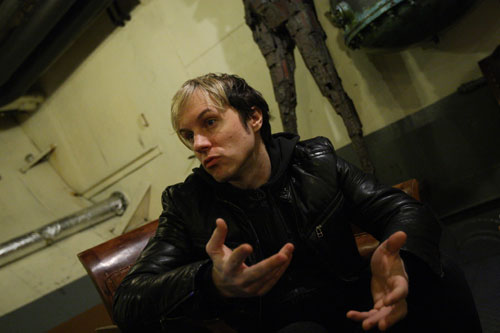
Composing the tracks.. how much does it come from thoughtful planning, how much from intuition?
ALEC: From what I’ve heard from all the directors so far was that they were always surprised how much I understand the characters. All four of them saw a side in the acting they didn’t even think of.. the characters developed a kind of depth that just wouldn’t be there without the music, because it can show the inside of emotions from an actor. I think the biggest part is sensing that, wondering what the characters would do, how they would feel like, do we buy that? There was this scene where the director wanted to take take out the scene where the main characters meet and then kiss.. and somehow it just didn’t work, the image was such a stereotype.. and I said “let me just try something with the music..”
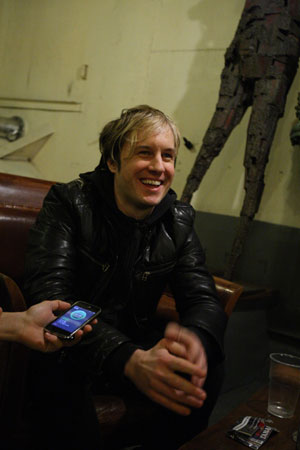 Which movie was that?
Which movie was that?
ALEC: Oh, it was Chaostage by Tarek Ehlail. You heard about Chaostage in Hannover? There was a time in the mid-80s for about ten years.. every year punks and leftists would meet in Hannover and there would be a riot, something like May 1st in Berlin. It was actually less political than people would think, that’s the strange thing about this. All these punks were there just to shake up the controlled environment. You know, Hannover is a very boring city.. not anymore, that’s the weird thing! Since that stuff happened, somehow.. we played a show there last year and lots of things have changed, lots of people are much more open. These events don’t happen anymore but.. there’s a book that sold quite well in Germany, a story based on the events, using the setting and background of these events. The film is about the book. The interesting thing is, they took all the punks and things to recreate the Chaos Days scenes and this got a lot of attention. There was a premiere last October on the day of Reunification, October 3rd in Hannover and there were riots in the cinema and the tabloids, Bild Zeitung and all the tabloids put one-page stories and wrote about all the punks.. this is exactly the kind of thing you want, almost and the director knew the timing as well. A lot of famous German actors were in that film, it was a really great project. It’s very interesting if you know the other side of it, the history, the political background from that time.. it almost has a documentary value.
What movies are you going to work with in 2009?
ALEC: That’s a good question. At the moment I have some scripts and there’s one that’s really interesting, a film about an autistic child and the film’s shot from the perspective of that child and this makes a really interesting soundtrack. You have to create an atmosphere to see things we consider normal from a completely different perspective and of course visuals and sound would work together in a very new way.
You write on EYHO that lots of things need to be changed and that music business is in ruins.
ALEC: When I put out Intelligence & Sacrifice in 2002, we thought, okay, if you can already download it, it’s a lost battle. Then after some time after all our negative perspectives it was selling still really well, in almost like ATR-like numbers. I just saw this coming. When you get something for free, everybody’s discussing how to do that and I don’t even want to argue and get depressed about it. That’s the nature of things now and we have to adapt to that as soon as we can. I think it was good that we accepted this reality, very early enough. I think I realized exactly at that time my career’s different from most of the others, anyway. I did a lot of labelwork and I always tried to keep the underground stuff moving, because I love to be a part of innovation and experimenting and I never gave that up for profit. The weird thing is – musicians obviously go through ups and downs – that people like it for some reason, you get way more people and there are times when something else is hip and it’s just the wrong timing, but you know, I think I can work with that. Because I’m a music fan as well, I know myself, I wouldn’t listen to the same stuff all the time. I think that’s the fun about music. That’s why I can’t identify with most pop music because they try to tell me the same thing all the time and not that’s not really entertaining even. Yeah, I always loved listening to new things, that’s maybe the best thing about having done labelwork.
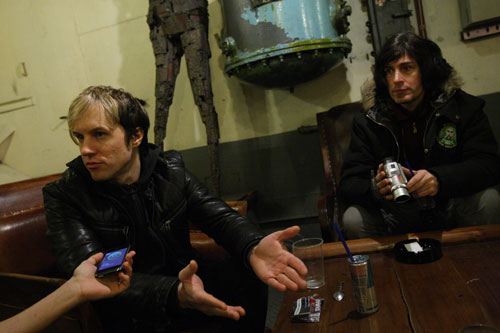
The blog, that’s just a way to get stuff across. Take my friend Mike Rodgers for example, he’s coming from the punk times, from LA but he’s been living in Tokyo for twenty years: the same night when Obama got elected, he wrote this really angry, almost critical article about Obama. I loved the fact that while everybody was seeing things superpositive, he just went against this – although I didn’t completely agree with that, I wanna use the blog to trigger even these kinds of discussion. I want people to make up their own mind and really think about stuff, not just take in everything. Same thing when I look at the music world – if you look at younger generations, especially in England, the music press goes aaah, the new Beatles and they really go for that for too long and I think that kind of time is over because we’re so confusing the press is losing more readers.
Blogs only work for musicians who probably have more to say then just presenting a song. This is good for us, but it leaves some musicians behind who only focus on their music, which is also a way of doing things. On the other hand, there are people who blame you if you’re not online all the time. Crystal Castles is like that. It’s a MySpace-type phenomenon where music is not convincing enough for me, it starts out as a hype on this platform – I can’t do anything with that and they fade out very fast.
Being online has lots of advantage, though – discover more stuff, you don’t need the first 2-4 weeks when a record comes out. For example, on last.fm more people are listening to Golden Foretaste than when it came out. We thought maybe they are the hardcore fans. And now the new stuff is undertaking but my kind of fans are not really people who would listen to last.fm.. what we get a lot is that people want the physical thing, they want to read something, they want to experience the concept, what did Alec think, why did he make the sequence of the song just like that…
So what’s coming up next?
ALEC: Somebody asked me once, You don’t like pop music? and I said, it’s not the point. That’s not true because I love a lot of pop – and stuff is either good or bad. I think Thriller’s a great album, Quincy Jones made an amazing job, especially with that song, the way it’s put together, it’s a great club record, way better than anything that Britney Spears would ever put out. You can make ideas into a very commercial thing and have quality at the same time.
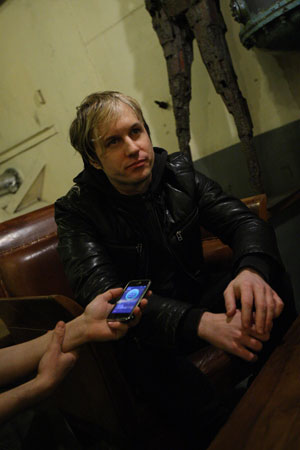 And it’s all part of globalization – the borders of nations might break up, you might have international success, many of the artists could be in the top ten in many countries, but this would still be a national phenomenon. The English charts would be a bit different from the German ones, but on the internet people listen what they want. I don’t think we need the one large opinion of the majority and I think that’s the biggest problem in the way major record companies and most of the media think: they always try to reach that big middle ground to sell the most units.
And it’s all part of globalization – the borders of nations might break up, you might have international success, many of the artists could be in the top ten in many countries, but this would still be a national phenomenon. The English charts would be a bit different from the German ones, but on the internet people listen what they want. I don’t think we need the one large opinion of the majority and I think that’s the biggest problem in the way major record companies and most of the media think: they always try to reach that big middle ground to sell the most units.
Can you tell us a bit more about the touring plans for The Hellish Vortex?
ALEC: We’re recording a lot of stuff in February and March and for the tour in May we’re working on a completely new show where almost everything comes together, it’s going to be much longer and we’re going through all the different phases of what I’ve done and this is going to be exciting… the weird thing is, certain older records are so different from what I do now, but somehow when you get the sounds in the studio when you try to put the show together and you realize that with Nic’s ideas to an older song it really starts working again.
Will you include the older ATR stuff as well?
ALEC: For these shows we gonna play some Atari Teenage Riot songs, we’re going to interpret them in a new way, update them. That’s a challenge – I know people who’ve seen Atari or know the videos will compare it and it’s always a big risk. I think it’s just the thrill to do something. Seven or eight years ago if I played it like that with Atari or Alec people would have just loved it but now I think it’s just the time to question these songs again, question their message – somehow lot of the stuff that we said are so true and so relevant..
But politics have always been relevant…
ALEC: Of course, of course! But I think nowadays a lot of people are way more open to question things they didn’t even see in music before. Last year people didn’t expect to have politics in music, now it’s a little different again. I hope music becomes more relevant in people’s life again. The major record industry and a lot of the mainstream media tries to exclude issues like that from music. Just pure entertainment, the same things every time, little differences in marketing. Not really relevant for people who live in our society in a very normal kind of way, I would say. The MTV is the best example – how would you identify with these kinds of music videos at this point?
How about your Live in Paris DVD?
ALEC: That’s going to be mixed in February. First we wanted to get it out sooner but we thought we’d need some time after the Atari DVD, people do not want all these at once. The visual stuff is done and we’re checking – we recorded the live on three concerts from different phases of the band, they’re all multi-tracks and we just want to make sure the mix is really good for this – this is what we gonna do in February. It could come out maybe at the end of August.
Is this a good year to start things?
ALEC: I think so. It’s important that people get that independent spirit again.. do things their own way, also on a local level, when people have a good idea they feel people won’t listen to this kind of music, they should start a clubnight rather than going What’s happening in the UK?, because it might not be relevant at all. It’s a year when a lot of people are going to react out of panic and fear. Music reps, A&Rs already do. Every decision that’s been made since 2004, I think it’s started with 9/11, since that was the first time the economy was so badly affected. And MP3s. Most A&Rs don’t make decisions based on long-term logical thinking. “I want to keep my job for another month.” If you want to develop something, like a band, it’s stupid to think like that. I had this discussion with another guy who said ringtones make so much money you don’t have to develop careers at all. A lot of people in the music industry think like that. A lot of people think the same way on Wall Street – hype something, make as much profit as you can, hop onto the next thing. I think Crystal Castles is the best example. I’m not against this band but again, they played in Berlin and it was a horrible show. People there we like oh but they 250 thousand friends on MySpace! It was just weird, a bubble like that can burst very fast.
Any piece of advice for 2009 for The Dose readers?
ALEC: This might sound conservative. Education. How you educate your own mind. This is the capital of almost every person: the more you know, the more you work on that, the greater your value is. A lot of people are wasting their talent and they get left behind very fast. You could have a lot of money in the bank but then it gets lost in a second. Knowledge always belongs to you.
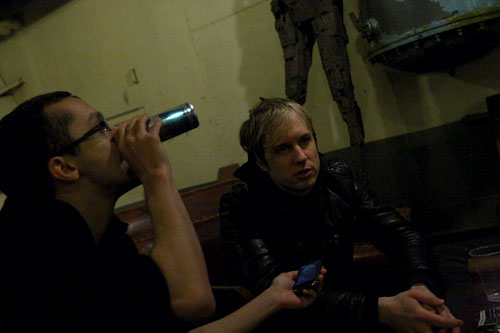
And as a final question – last time in Berlin we talked about a thing called the “riot frequency” that’s basically used to trigger an effect in the listeners.. could you elaborate on that, give us the specs?
ALEC: It’s not like a secret or something. It’s two things working together – everything working in the range of 1kHz to maybe 2 kHz, the sound of the distorted guitar is in that range as well. What a lot of people don’t understand is that everything above 16 kHz is also very important for the brain, it tries to work with that information. Unfortunately this is also the frequency that gets filtered out in MP3s. These two frequencies are also important for noise music. The stuff that you do not notice with your conscience – I mean, I myself would – that’s very important, because something that you hear with your conscience is really what happens to you. That’s the problem with a lot of digital formats, they make things smaller by getting rid of the stuff that people don’t hear. Same with low bass, not really a right frequency in the right way and it can also attack you in the physical way. It should be used more, in games, movies, anything that should be more exciting!